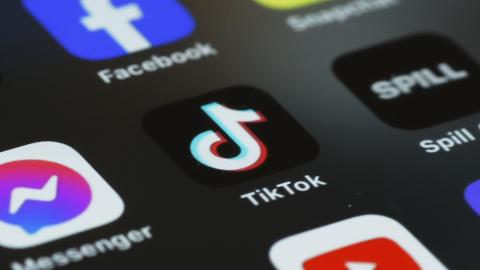As someone who has led the charge for banning TikTok since 2020 in the media and in the halls of Congress, I suppose I should be pleased that the House of Representatives has finally passed a bill with strong bipartisan support that could lead to a ban of the Chinese-owned social-media platform.
But I find I have mixed emotions about the vote.
Don’t misunderstand. I still think TikTok poses a severe threat to our national security and even our cultural fabric. I still believe that President Biden’s decision to throw out the ban originally proposed by President Trump was foolish and short-sighted — and that Congress’s move to correct that mistake was long overdue.
Still, I don’t think even the bill’s supporters understand the real TikTok threat: that a Chinese company and a team of Chinese engineers managed to bewitch a generation of Americans — and put our own social-media companies to shame.
With more than 1.5 billion users worldwide, and an estimated 170 million users here in the U.S., TikTok has been steadily regrooming our cultural landscape, particularly the half of American TikTok users who are between the ages of 18 and 34.
In an era when data is becoming the world’s most important strategic commodity, unfettered access to data by Chinese-owned companies like TikTok and its parent company ByteDance, or Chinese telecom-equipment giant Huawei, certainly should be a grave matter of national-security concern.
Yet more alarming is the algorithm TikTok uses to screen users’ preferences, which was designed by parent company ByteDance. It can use just a handful of visual clues based on a user’s watch time on a given video to identify the piece of content a user is vulnerable to, then to give that user more of it — and more and more.
The algorithm is what makes TikTok addictive, and can turn users into unthinking Pavlov-like responders to the visual stimuli supplied by the algorithm. It’s what leads critics such as Congressman Mike Gallagher (R., Wis.) to compare TikTok to fentanyl.
The TikTok challenge doesn’t stop there, however. As reporters for Forbes found out, TikTok also has a so-called “heating button” its staff can use to boost specific posts and videos they want. The button can make any story appear viral, even when it’s not.
In fact, sources claim that the company uses the heating button for its own benefit, to boost brands and influencers it wants to partner with — including propaganda supporting the Chinese Communist Party.
Yet the scandal surrounding TikTok is even bigger than that. As tech blogger Eugene Wei (no foe of TikTok) has pointed out, TikTok and its algorithms were developed by Chinese software engineers with little or no knowledge of America or American culture. Yet they managed to create a social-media platform that has captured the imaginations of 170 million American users, including — or especially — the most tech-savvy generation in U.S. history.
The fact that such an app could land here and dominate the American tech space should shake Silicon Valley down to its roots. It’s not a good sign for the health of our vaunted high-tech sector when a Chinese social-media company has a better grasp of how to shape the minds of young Americans than American companies like Meta and X, or even Google and Amazon.
Or when it understands better how to mobilize its users to combat legislation it doesn’t like. The fact that TikTok’s campaign against the bill backfired, and may have convinced many in Congress that TikTok does indeed represent a threat, doesn’t disguise the fact it showed the power of social media to shape the political landscape — when it’s in the right hands.
Even if TikTok does wind up being sold to an American buyer like Microsoft or Oracle or Kevin O’Leary, the platform will be useless without the algorithms, which ByteDance will be sure to hang on to.
So before deciding whether to ban TikTok if ByteDance does refuse to divest — which is almost certain — there’s another question worth asking: Where’s the American alternative?
This is a problem many of us faced when in and out of the Trump National Security Council, when we pushed other nations, including allies, to stop Huawei from building its 5G networks at bargain rates, or even with extended credit. After listening carefully to our exposition of Huawei’s threat to data and national security, diplomats and tech executives would invariably ask: “So what alternative are you offering?”
More often than not, there was none. Our government never put together an effective 5G strategy that brought American and allied companies together to outbid and outperform the vaunted Huawei monolith.
The bottom line: It doesn’t pay to attack Chinese high tech if our own Silicon Valley can’t compete and surpass it. This is why Donald Trump’s worry that banning TikTok will empower Facebook seems particularly fatuous. It’s like worrying about a Nissan Sentra outdriving your Lamborghini.
Again, don’t misunderstand. No one wants Big Tech to wield the kind of hypnotic power over its users that TikTok has brought to bear. But it would be nice to know that power and know-how is there, if we need it.
And we will, very soon. It’s time to stop just reacting to the Chinese tech threat and start launching our own tech offensive to win the hearts and minds of China and the rest of the world, as well as their pocketbooks, to the cause of freedom.

















